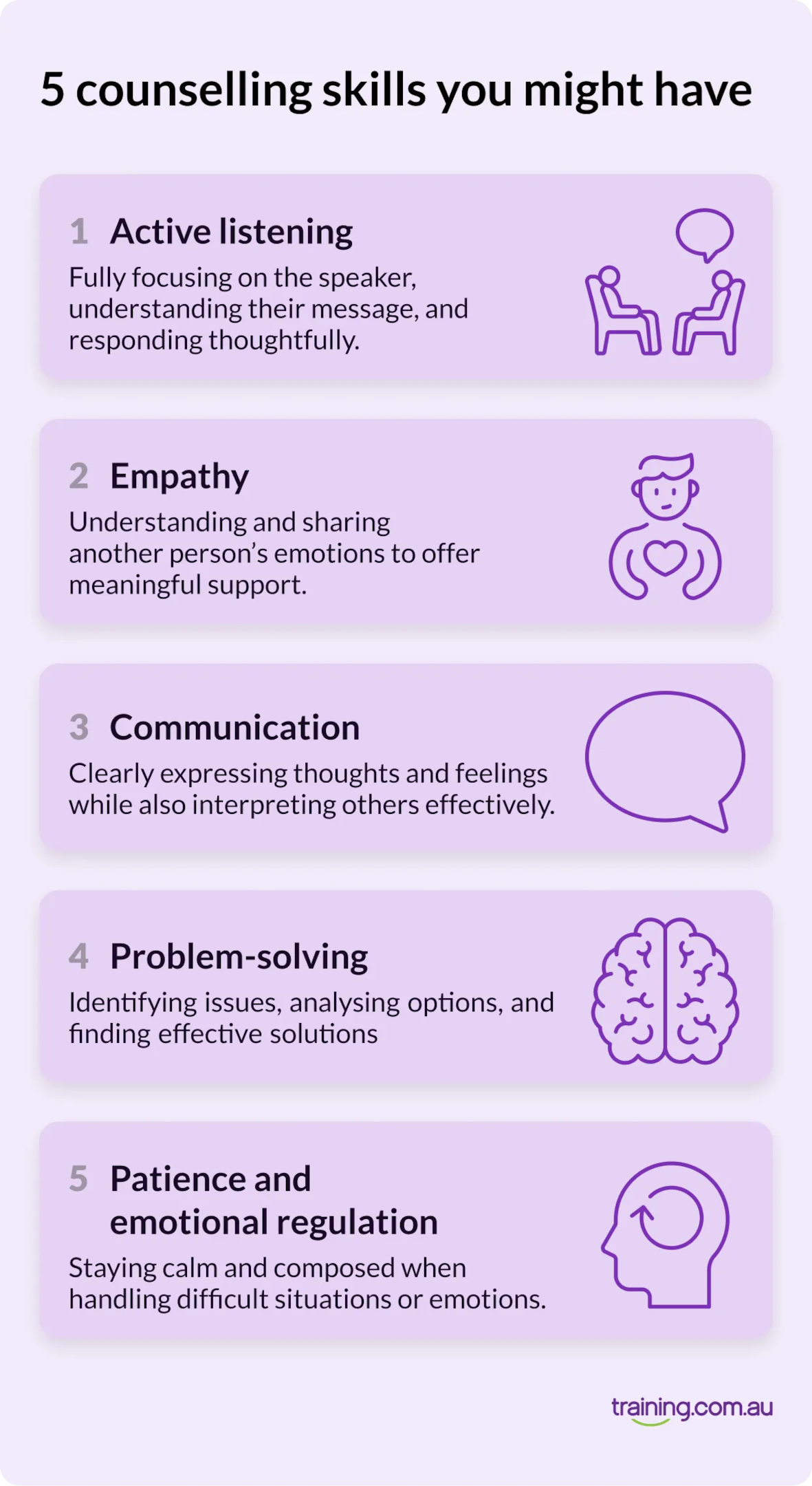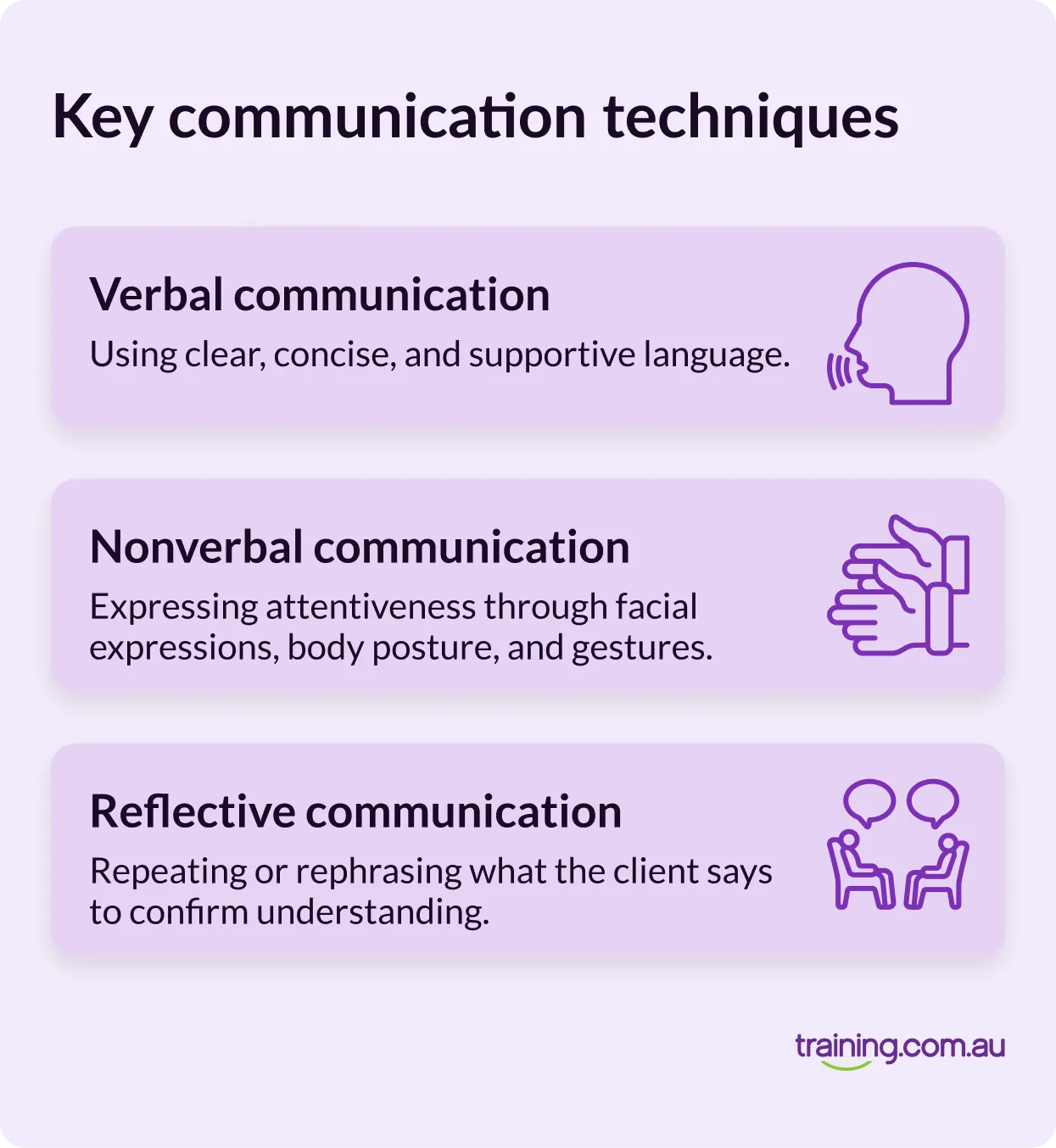5 Counselling Skills You Might Already Have

Counselling is a valuable profession that requires a unique set of social and communication skills. If you’re thinking about a career in counselling, you may already have some basic counselling skills that you can continue to improve.
To support their clients, counsellors need to develop qualities such as empathy, patience, and flexibility. Continuing professional development also helps counsellors stay updated with advancements in their field, ensuring they provide the best possible support.
This article breaks down five essential counselling skills you might already have and how to succeed in this profession.
What are counselling skills?
Definition of counselling Skills
Counselling skills are a set of essential techniques and strategies used by counsellors to facilitate effective communication, build trust, and establish a strong therapeutic relationship with clients. These skills are designed to help clients explore their thoughts, feelings, and behaviours and work towards achieving their personal goals and overcoming challenges.
Counselling skills are not limited to professional counsellors and therapists, but can be applied in various settings, including education, healthcare, and business, to improve communication and relationships.
What skills do I need to become a counsellor?
- Active listening
- Empathy
- Communication
- Problem-solving
- Patience and emotional regulation
1. Active listening
What is active listening?
Active listening involves fully concentrating on what the speaker is saying rather than just passively hearing the words. It helps clients feel understood and valued, a crucial component in any counselling relationship.
How active listening helps in counselling
Actively listening encourages clients to share their thoughts freely. It builds trust and rapport between the counsellor and client and helps counsellors gather relevant information for effective guidance.
How to improve active listening
- Maintain eye contact and use open body language.
- Paraphrase what the client says to ensure understanding.
- Avoid interrupting or jumping to conclusions.
- Use clarification to uncover the root of issues by seeking more details when something is unclear.
2. Empathy
What is empathy?
Empathy is the ability to understand and share another person’s feelings. It’s a critical counselling skill that allows professionals to connect with clients on a deeper emotional level.
Why is empathy Important in counselling?
- Helps clients feel understood, reducing feelings of isolation.
- Encourages open and honest communication.
- Strengthens the therapeutic relationship between the counsellor and client.
Ways to develop empathy
- Practice perspective-taking by imagining yourself in the client’s situation, being present and adaptable to their needs.
- Use open-ended questions to explore the client’s emotions.
- Validate the client’s experiences without judgment.
3. Communication skills
What are communication skills in counselling?
Effective communication, which includes effective counselling skills, is essential for delivering guidance, clarifying confusion, and fostering meaningful conversations between a counsellor and their client.
How to improve communication in counselling
- Be mindful of tone and body language.
- Encourage clients to express themselves freely.
- Ask open-ended questions to promote discussion.
4. Problem-solving ability
What is problem-solving in counselling?
Problem-solving means helping clients face challenges. It also involves finding solutions that match their values and situations. Visualisation can provide insight into how clients interpret events problematically, offering a unique perspective that can guide the problem-solving process.
Why is problem-solving important in counselling?
- Problem-solving is a valuable skill that enables clients to find constructive ways to overcome obstacles.
- Encourages self-reflection and self-awareness.
- Helps clients develop coping strategies for future difficulties.
How to enhance your problem-solving skills
- Use goal-setting techniques to outline achievable steps.
- Help clients explore multiple perspectives before making decisions.
- Encourage self-directed solutions rather than providing direct answers.

Looking for a mental health professional?
If you’re looking for compassionate and professional mental health support, check out the Daily Psychology. Cecilia Daly, an experienced psychologist, offers a range of services to help individuals, couples, and families navigate life’s challenges.
5. Patience and emotional regulation
Why is patience important for counsellors?
Patience helps counsellors stay calm and supportive. This is important when clients have trouble expressing their thoughts or dealing with emotional pain.
How emotional regulation supports counselling
- Prevents counsellors from reacting impulsively to difficult situations.
- Helps maintain a professional and composed demeanour, which is essential for advancing the therapeutic process.
- Ensures that clients feel safe and heard during counselling sessions.
Tips for building patience and emotional regulation
- Practice mindfulness and stress management techniques.
- Develop a habit of deep breathing before responding to clients.
- Set realistic expectations for client progress.
- Encourage clients to use self-talk as a valuable intervention for coping with stress and anger, helping them manage their emotions effectively.
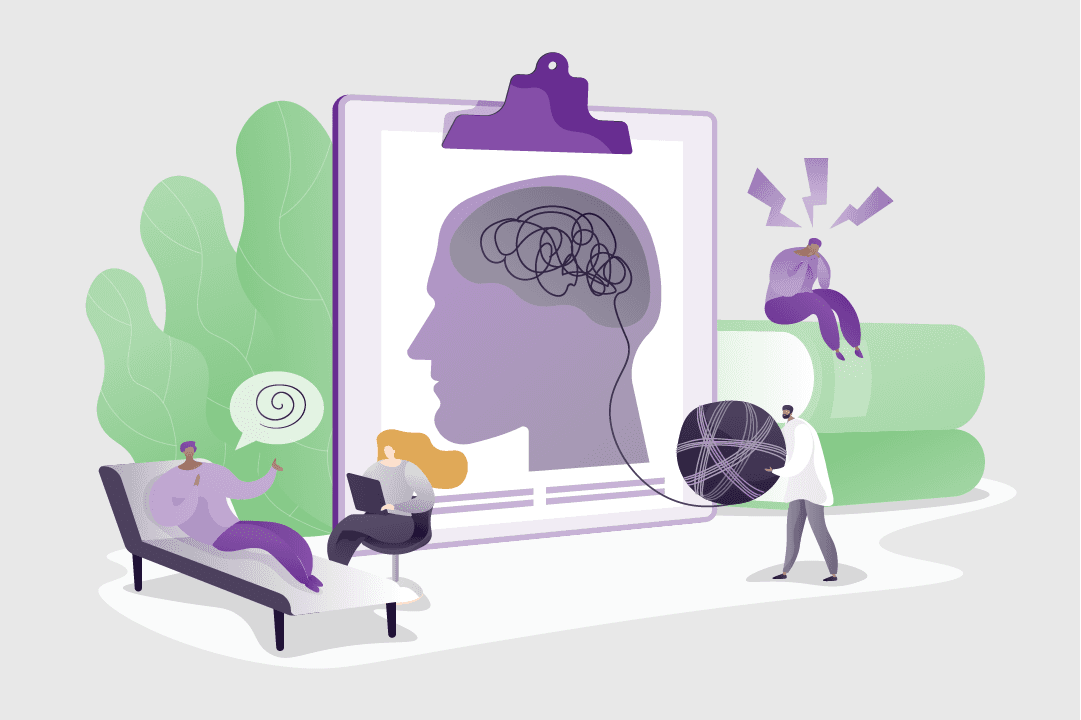
New to counselling? Start here
Not sure where to begin with counselling? We’ve created a complete guide that walks you through the qualifications, skills, and pathways to get started.
Building rapport and establishing trust
Techniques for building rapport
Building rapport and establishing trust are crucial components of the counselling process. Rapport refers to the connection and understanding between the counsellor and client, while trust is the foundation of a successful therapeutic relationship. Techniques for building rapport include:
Active listening
Giving the client your full attention and using verbal and nonverbal cues to show engagement and understanding.
Empathy
Understanding and sharing the client’s emotions and perspectives.
Nonverbal communication
Using body language, facial expressions, and tone of voice to convey empathy and understanding.
Open-ended questioning
Asking questions that encourage the client to explore their thoughts and feelings.
Reflection
Reflecting the client’s words, emotions, and experiences to demonstrate understanding and empathy.
By using these techniques, counsellors can establish a strong therapeutic relationship, build trust, and create a safe and supportive environment for clients to explore their concerns.
Applying counselling skills in everyday life
Importance of counselling skills in personal and professional relationships
Counselling skills are not limited to the counselling room but can be applied in everyday life to improve personal and professional relationships. Effective communication, active listening, and empathy are valuable skills that can be used in various settings, including:
Personal relationships
To improve communication and understanding with family and friends.
Professional relationships
To build trust and establish strong working relationships with colleagues and clients.
Education
To create a supportive learning environment and improve student-teacher relationships.
By applying counselling skills in everyday life, you can improve your communication skills, build stronger relationships, and enhance your personal and professional growth.
Counselling is a rewarding career built on connection, communication, and empathy — and chances are, you already have some of the foundational skills it requires. By recognising and developing these everyday strengths, you’re well on your way to making a real impact in people’s lives.
If you’re ready to turn your potential into a professional pathway, explore counselling courses and take the first step toward a meaningful career.
Browse Results
Diploma of Nursing (SA Only)
Build a meaningful career that makes a difference with the HLT54121 Diploma of Nursing. This nationally recognised qualification provides the essential skills, knowledge, and practical training needed to become a qualified Enrolled Nurse in Australia....


Graduate Diploma in Management
The Graduate Diploma in Management is an online postgraduate qualification that is ideal for busy senior managers, with a potential entry pathway through any of our Graduate Certificates and study that is highly supported, fits into your schedule, and...

Graduate Certificate in Management
The Graduate Certificate in Management is an online postgraduate qualification that is designed for newer and ambitious professionals, with entry possible through management experience alone and a study structure that easily accommodates full-time work...

Certificate III in Community Services (WA Only)
The Certificate III in Community Services is perfect for entry level community services workers who support individuals through the provision of person-centred services. Work may include day-to-day support of individuals in community settings or suppor...

Certificate IV in Fitness
Take the next step in your career and gain the qualification you need to become a Personal Trainer. If you currently work in the fitness industry as a Gym or Group Fitness Instructor, elevate yourself to the next level by studying the SIS40221 Certific...
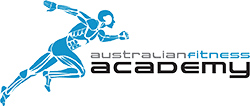
Certificate III in Fitness
If you’re looking to begin your career in the fitness industry, studying the SIS30321 Certificate III in Fitness is the perfect qualification to get you started. Gain all the knowledge and skills you need to enter the industry as a Gym Instructor or Gr...

Personal Trainer Course
Join the fitness industry as a Personal Trainer and turn your love for fitness into a rewarding career by graduating in both the SIS30321 Certificate III in Fitness & SIS40221 Certificate IV in Fitness. Enjoy the flexibility of being your own boss...

Bachelor of Health Science (Clinical Nutrition)
Clinical nutritionists integrate traditional food wisdom and current scientific evidence to motivate individuals and communities to eat well and live healthier lives. The Bachelor of Health Science (Clinical Nutrition) is supported by a strong underpin...

Bachelor of Health Science (Naturopathy)
Naturopathy is a whole medical system combining theory (philosophy and principles) and practise that uses an array of natural therapies to support healing and maintain health. Naturopaths aim to treat the underlying causes of illness and disease. The c...

Certificate III in Community Services (Perth Only)
Are you a natural when it comes to providing guidance to people? Would you like to kick start a career in Community Services? The Certificate III in Community Services (CHC32015) is the perfect entry-level qualification for prospective Community Servic...
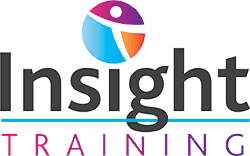
Certificate III in Individual Support (Ageing OR Disability) (Perth Only)
If you have a passion for helping those most in need, this qualification is one way you can utilise your knowledge for the benefit of others. Package the Certificate III in Individual Support (Ageing or Disability) (CHC33021) to save time and gain know...

Certificate lll in Early Childhood Education & Care (Perth Only)
If you love working with children and want to learn more about providing quality education and care in a range of environments, this course is for you. The Certificate lll in Early Childhood Education and Care (CHC30121) can provide you with an entry-l...

Certificate III in Individual Support (Disability) (SA Only)
The Certificate III in Individual Support (Disability) is designed to equip you with the practical skills and knowledge to support people living with disability in a variety of care settings. With a focus on person-centred support, you’ll learn how to...


Certificate III in Non-Emergency Patient Transport (VIC Only)
Our Promise We are confident in the delivery of our training. On successful completion of the course, graduates will be guaranteed a telephone interview for vacant Patient Transport Officer positions in the Non-Emergency Patient Transport division. So...
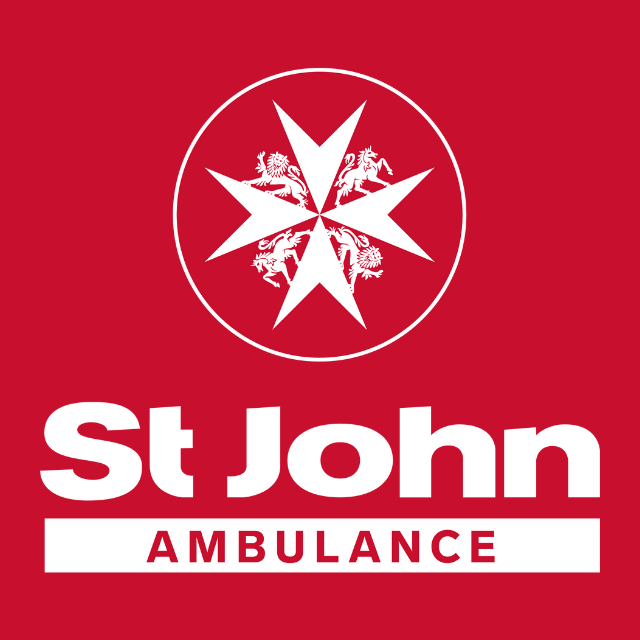
Diploma of Community Services (Perth Only)
The Diploma of Community Services qualification reflects the roles of community services, case management and social housing workers involved in the managing, co-ordinating and/or delivering of person-centred services to individuals, groups and communi...

Certificate IV in Business (Perth Only)
This qualification is suited to those working as administrators and project officers. In this role, individuals use well-developed skills and a broad knowledge base to apply solutions to a defined range of unpredictable problems and analyse information...

Certificate III in Process Manufacturing (Perth Only)
The Certificate III in Process Manufacturing is designed for those working or looking to work in production, warehousing, or factory roles. This hands-on course equips you with the practical skills needed to operate machinery, follow safety procedures,...

Certificate III in School-Based Education Support (Perth Only)
Are you interested in becoming a teacher’s aide? Work with teachers to create a comfortable and supportive environment for children’s learning. You will ensure lessons run smoothly while also developing the student’s literacy, numeracy and resear...

Certificate III in Allied Health Assistance (Perth Only)
A Certificate III in Allied Health is your entrance into the world of health services! This course will teach you to support workers in a range of fields such as audiology to social work. You will use your qualification to gain an entry-level job in ei...

Certificate III in Individual Support (Perth Only)
This qualification is for those who want to work in the community or in a residential setting, following a customised plan to give person-centred assistance to individuals who may need it due to ageing, disability or other circumstances. Work involves...

